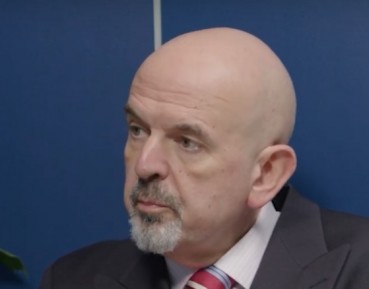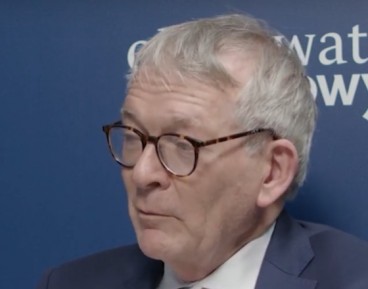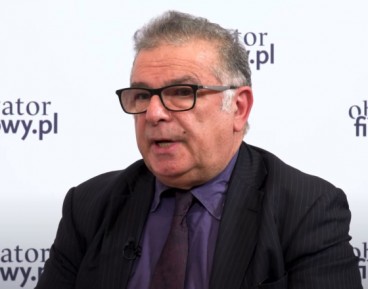Iliya Lingorski: Accession to the eurozone is our priority
Category: Wideo
“Obserwator Finansowy”: What is so special about Central Europe?
Magdolna Sass: A good question. I think if we approach it from an economic point of view, then it’s really different from the other parts of Europe, from Western Europe. So we can see many similarities between, especially between the Visegrad countries, Poland, Czechia, Slovakia and Hungary. In terms of their economic structure, in terms of their development path, in terms of their inherited structures, and their past as planned economies, I think it all had an impact on their later development. But by now I think there are some signs of increasing heterogeneity among these countries of the region as well. So for example, the reliance on foreign-backed investment, the reliance on government intervention into the economies is now quite different.
What are the biggest challenges that the Visegrad countries face today?
I think foreign exposure is quite high, maybe with the exception of Poland. And I think ownership matters. So as I see the emergence of Polish multinationals, I think that’s very important, to have your own very competitive companies that are so competitive that they are able to invest abroad. We have some signs that there are good competitive multinationals in Czechia, in a special construction, because many Czech multinational have their seats abroad and not in Czechia. And I think Hungary has some good multinationals, a few of them, very much concentrated outside activities. Slovakia is the least competitive from that point of view. I think ownership matters, so it’s good to have your own companies that are competitive enough because you can become independent more or less from what’s going on in the world and in your most important partner countries and you can have your own strategy. While if you are very much exposed to foreign companies, this is multinational companies or foreign partners, this is less true.
So does it mean that we should support our local industry to feel secure and to boost our growth?
I think that’s a kind of double-edged word. We always have a problem with “supporting”, it’s always problematic to select the winners, it’s always problematic to select national champions and so on, so there are many risks in that selection, but it seems that the world is going towards more intensive industrial policies, more intensive support for domestic companies, and you cannot be left out from that development, and there are, I think, many responsibilities and risks for the government to continue such a strategy.
Sometimes I think that South Korea is a paragon of such a policy. Do you think it’s possible we may follow their policy?
I think South Korea was much luckier in terms of timing. So when South Korea emerged with a very strong state intervention as an emerging country, and an industrialised country, that was in times when there were less strict global and international rules about state support, about state support to exporting companies and so on. So in that sense they were much luckier in terms of timing. Nowadays I think it is much more difficult, it is much more constrained, but still, it seems that there is a revival of state intervention. But I want to emphasise that I’m not fully and without any doubts supportive of such policies, because I was born in a socialist planned economy, Hungary, and I saw how markets can be a better means for economic development than a planned economy system.
Today we may observe that the world is in a state of turmoil. How might the protracted war in Ukraine and clashes between Palestinian people and Israel affect today’s world, not only the economy, but policy as well?
Yes, I agree very much that these developments are something new. We never expected, for example, a war in our neighbourhood, in such a close neighbourhood of the European Union and of our countries. So this is something new. Also I think the Israeli-Palestinian conflict, moving into the direction of maybe expanding into a war, is also a very unexpected development, although the tensions were always there. I think that these are really, from our point of view, from the economics point of view, these are very important because they raise the importance of national security. And then we may have much more policy intervention into the economies, sometimes with real national security concerns, in other cases with the disguise of national security concerns. So I expect that this will give the ground for more government intervention in many countries. And the other thing is the supply shocks it may cause and the energy price peaks and so on. So it’s again something that we have to cope with.
But when we take into account new potential supply shocks, do you think that the threat of a fully-fledged global recession is possible?
Unfortunately we cannot really rule that out, so this would be very unfortunate, because we are now living in the period of shocks – first COVID, then Russia’s invasion of Ukraine, now this Israeli-Palestinian conflict, which is really something we didn’t expect. We thought that things had cooled down in this region. So there are so many extra economic shocks that I would not rule out a recession, though the international organisations – IMF and OECD – do not expect for next year a substantial decrease in growth. Even they expect some increase compared to 2023 growth rates in, for example, our region. But I think this is something unexpected, they didn’t take it into account, it happened just a few days ago, in Israel, the Hamas attack, which can cause again energy price peaks and other things which can again slow down the economies in the world. So, I think now, the chances are higher due to that conflict that we have to face a recession.


